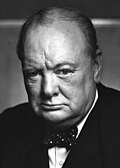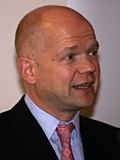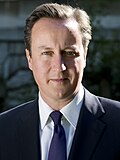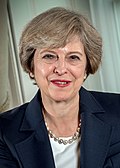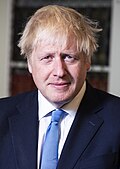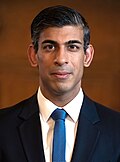| Leader of the Conservative and Unionist Party | |
|---|---|
| Logo for the Conservative Party | |
| Type | Party leader |
| Status | Chief executive officer |
| Member of | Conservative Party |
| Inaugural holder | Robert Peel (de facto) Bonar Law (de jure) |
| Formation | 1834 (de facto) 1922 (de jure) |
The leader of the Conservative Party (officially the leader of the Conservative and Unionist Party) is the highest position within the United Kingdom's Conservative Party. The current holder of the position is Kemi Badenoch, whom the party elected on 2 November 2024 when she outpolled Robert Jenrick. [1]
Contents
- Selection process
- Overall leaders of the party (1834–1922)
- Leaders of the party (1922–present)
- Timeline
- Houses of Lords and Commons leaders
- Leaders in the House of Lords (1834–present)
- Leaders in the House of Commons (1834–1922)
- Elections of Conservative leaders by party meeting
- House of Commons
- House of Lords
- Deputy Leaders of the Conservative Party
- List of deputy leaders
- See also
- Notes
- References
From the party's formation in 1834 until 1922, the leader of the Conservative Party was not a formal position; instead, separate individuals led the party within each chamber of Parliament, and they were considered equal unless one took precedence over the other, such as when one was serving as prime minister. Following the passage of the Parliament Act 1911, the reduction of power in the House of Lords suggested that the Conservative leader in the House of Commons would become preeminent, but this situation was not formalised until 1922.
Since 1922, leaders of the Conservative Party have been formally elected, even when the party is in opposition. Originally, the party leader was appointed opaquely by other high-ranking members of the party. This process was gradually democratised in the late-20th century; in 1965, the appointment was linked to a vote by party MPs, and in 1998, the process was opened to all party members to decide between the top two candidates selected by parliamentarians. [2] [3] Under the party's rules, members of the party can vote for a leader even if they are not British citizens, do not reside in the UK, and do not have the right to vote in British elections. [4] [5]
When the Conservative Party is in opposition, as is the case as of 2025 [update] , the leader of the Conservative Party usually acts (as the head of second-largest party) as the Leader of the Opposition, and chairs the shadow cabinet. Concordantly, when the party is in government, the leader usually becomes Prime Minister of the United Kingdom, First Lord of the Treasury, Minister for the Civil Service and Minister for the Union, as well as selecting members of the Cabinet. Four of the party's leaders have been women: Margaret Thatcher, Theresa May, Liz Truss and Kemi Badenoch, all of whom, except Badenoch, have served as prime minister. Rishi Sunak was the first British Indian party leader and prime minister. [6] The only Conservative leaders (excluding temporary acting-leaders) not to contest a general election have been Neville Chamberlain, Iain Duncan Smith and Truss (each of whom resigned before the calling of an election).









